Introduction: The Presidency Has Become a Profit Engine—And We’re All Paying the Price
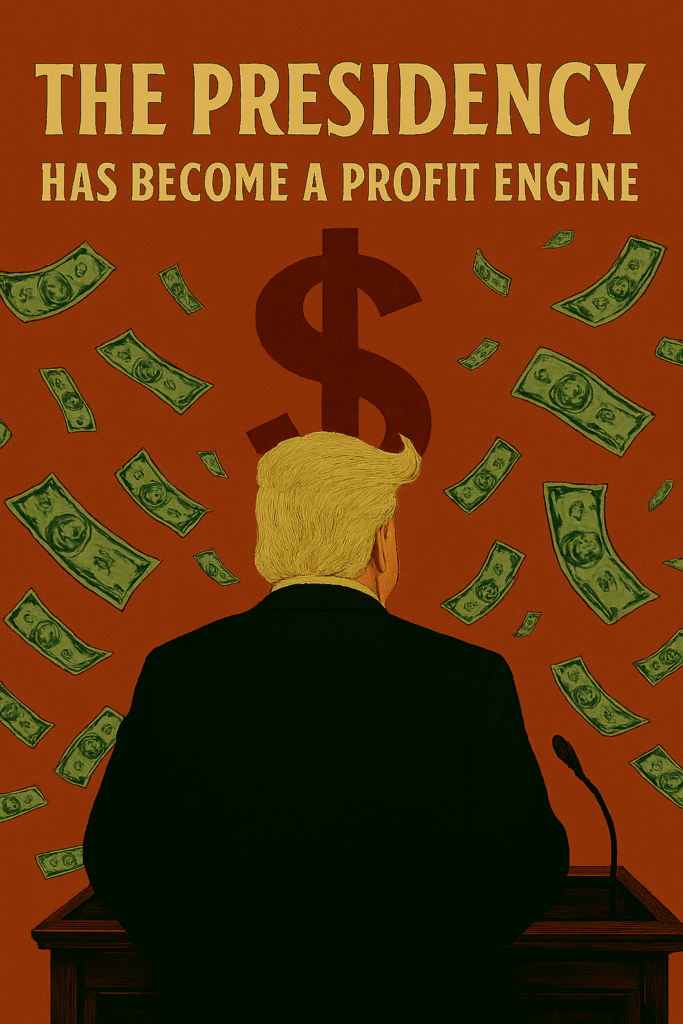
Did you know ex-presidents can earn more in a single speech than they made in eight years on the job?
Once a symbol of national service, the presidency has morphed into something far more transactional: a gateway to personal enrichment on a scale that would make Wall Street blush. Today, the office isn’t just about leading the country—it’s about building a brand, monetizing influence, and cashing in on the prestige of power.
We’re witnessing a disturbing inversion of public service. If the nation were not so caught up in the spectacle of the current presidency, this would result in a great degree of mistrust and even public revolt. A modern president can leave office with a pension and walk straight into a multimillion-dollar speaking tour, a publishing empire, and a portfolio of corporate board seats. The Oval Office has become the ultimate launchpad for private gain—and the consequences ripple far beyond the balance sheets of former presidents.
This post isn’t just a breakdown of the numbers. It’s a call to attention. Because when leadership becomes a stepping stone to celebrity and profit, democracy itself is on the auction block.
The New Era of Presidential Profiteering
Based on recent investigations—including a major exposé by The New Yorker—Donald Trump and his immediate family have reportedly profited around $3.4 billion from his time in office as of mid-2025. That figure includes:
| Source of Profit | Estimated Amount | Notes |
| Cryptocurrency ventures | ~$2.3 billion | Includes stablecoins, NFTs, and crypto ETFs via Trump Media |
| Private meetings & influence access | ~$5 million per meeting | Not officially confirmed, but widely reported as a going rate for high-level access |
| Mar-a-Lago membership surge | ~$125 million | Initiation fees rose from $100K to $1M since 2016 |
| Foreign investments (e.g. Saudi fund) | ~$2 billion | Includes deals with sovereign wealth funds |
| Trump Media stock & crypto holdings | ~$412.5 million | Includes meme-stock sales and Bitcoin acquisitions |
Journalist David D. Kirkpatrick emphasized that these figures reflect income directly tied to Trump’s presidency, not just his pre-existing businesses.
Why It Matters
This level of profit raises serious questions about the intersection of public office and private gain. The deals—especially those involving foreign governments and digital assets—blur the line between diplomacy and personal enrichment. And while some of these ventures may be technically legal, they challenge long-standing norms about presidential ethics.
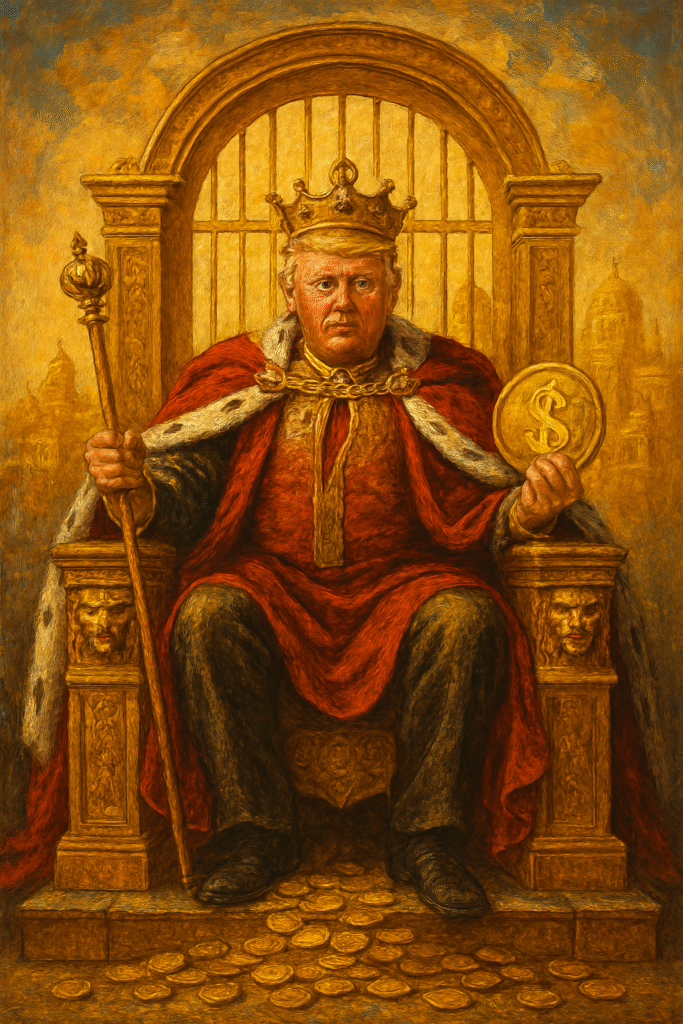
According to a 2025 analysis by The Economic Times, the Trump family has amassed an estimated $3.4 billion through ventures directly tied to Donald Trump’s time in office. This includes cryptocurrency projects, real estate deals, merchandise sales, and exclusive access arrangements. Much of this profit was facilitated by his children, who managed business transactions in ways that avoided traditional political disclosure requirements.
Compare that to previous presidents:
- Bill Clinton saw the largest post-office wealth increase before Trump, growing his net worth from $1.3 million to $120 million, largely through speaking engagements and book deals.
- Barack Obama increased his wealth from $1.3 million to $70 million, mostly via publishing.
- George W. Bush, Ronald Reagan, and others saw modest gains, typically in the tens of millions.
Even factoring in inflation and post-office earnings, no modern U.S. president has personally profited from the presidency itself at the scale Trump has—especially while still in office. And unlike others who earned after leaving, Trump’s empire expanded during his tenure, with deals often overlapping official state visits and diplomatic engagements. This has become a scheme. It’s a historic shift in the boundary between public service and private gain.
Top U.S. Presidents by Net Worth Growth from Presidency
The top five modern Presidents who have profited because of becoming the president of the United States, in order, are: Donald Trump, Bill Clinton, Barack Obama, and significantly lower is George Bush and Ronald Reagan presidencies combined, which itself is far greater than the # 6 Profiteered President.
| President | Net Worth Before | Net Worth After | Estimated Increase | Primary Sources of Wealth | Notes |
| Bill Clinton | ~$1.3M | ~$120M | ~9,000% | Speaking fees, books, consulting | Largest percentage increase |
| Barack Obama | ~$1.3M | ~$70M | ~5,200% | Book deals, Netflix, speaking | Massive publishing success |
| George W. Bush | ~$20M | ~$40M+ | ~100%+ | Book deals, investments | Already wealthy pre-office |
| Ronald Reagan | ~$10M | ~$13M+ | ~30%+ | Speaking, memoirs | Modest post-office growth |
| Donald Trump | ~$3.1B | ~$2.6B–$3.4B | Contested | Real estate, branding, crypto | Lost wealth during first term per some reports |
Although Trump’s number is “contested…”
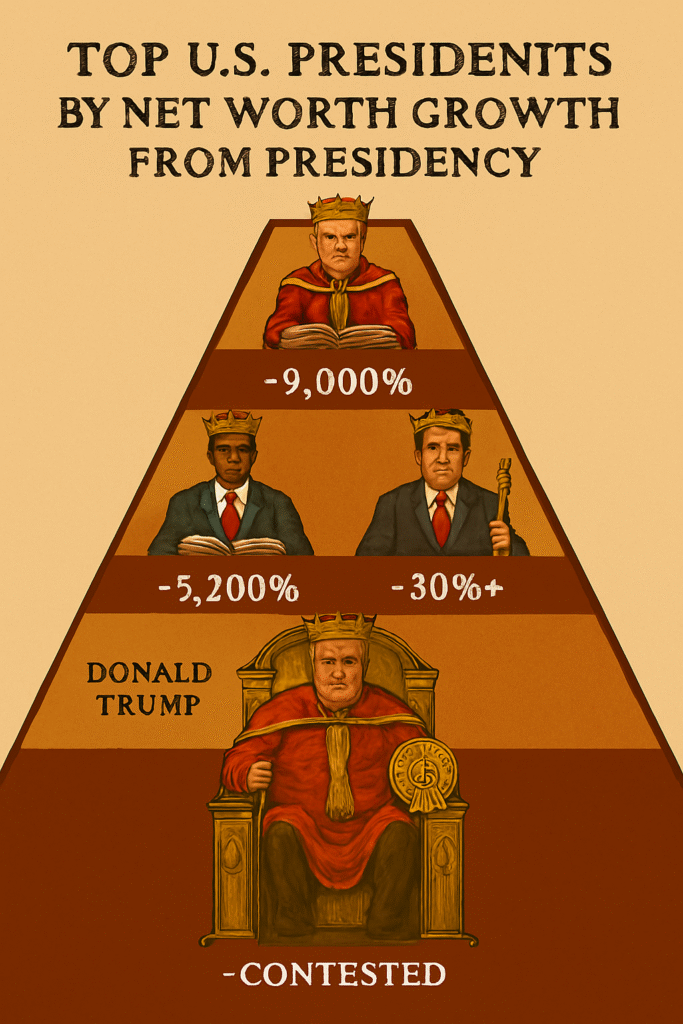
The Trump Exception
Trump’s case is unique. While his overall net worth was highest before becoming President, some sources claim he lost money during his first presidency due to pandemic-era real estate losses. However, other investigations suggest his family profited heavily through deals and branding tied to his time in office—potentially over $3.4 billion. So, if we include family and brand monetization, he definately tops the list in total gain, even if his “personal net worth” dipped <?> while in his first term in office.
Official Pay vs. the Real Payoff
The president has a legitimate high pay job. And they get a great Pension after their service. Most Presidents make enough from one term to live very comfortably their remaining years of retirement. Let’s have a look at the constitutional salary, benefits, and pension of a US President.
Annual Salary and Allowances (While in Office)
| Component | Amount (USD) | Notes |
|---|---|---|
| Base Salary | $400,000 | Set by Congress in 2001; taxable income2 |
| Expense Allowance | $50,000 | Non-taxable; covers official duties and personal expenses |
| Travel Account | $100,000 | For official travel; non-taxable |
| Entertainment Budget | $19,000 | For hosting and ceremonial functions |
| White House Redecoration | $100,000 | One-time allowance upon taking office |
Non-Monetary Benefits
Housing: Full residence at the White House, including furnishings and staff support
Transportation: Access to Air Force One, Marine One, and a fleet of armored vehicles
Healthcare: Comprehensive medical coverage for the President and immediate family
Security: 24/7 protection by the U.S. Secret Service
Staff Support: Dedicated team for administration, communications, and scheduling
Post-Presidency Benefits
| Benefit | Amount/Details |
|---|---|
| Annual Pension | $250,600 (2025 rate) |
| Office & Staff Allowance | Up to $150,000/year for 30 months; then $96,000/year |
| Travel Reimbursement | Up to $1 million/year for official duties |
| Lifetime Secret Service | For President and spouse |
| Healthcare & Transition Support | Continued coverage and transition services |
The total value of the President’s annual compensation package—including salary and perks—is estimated at around $569,000. While it’s substantial, it’s modest compared to some global leaders (e.g., Singapore’s Prime Minister earns over $1.6 million annually).
Most Presidents now receive six, and seven-figure offers after their presidency. These often come in the form of:
Book deals, speaking engagements, tours, endorsements, corporate advisory roles, fundraising awards, foundations, and real estate deals. However, it should be noted that until Trump took office, these extra profits have always come to Presidents from ventures after they are left office, not while they were supposed to be focused on serving the nation from the White House.
Some legitimate Profit Models
- Donald Trump: Leveraging real-estate fame into book and speech windfalls
- Barack & Michelle Obama: From bestselling memoirs to Netflix deals
- Bill Clinton: The $16 million speaking spree and consulting gigs
Most presidents leave office with a lifetime pension of around $200K. But by the end of their first year out, they’ve likely earned more on a single speaking tour than on eight years as commander-in-chief.
Legal, Ethical, and Public-Perception Challenges
Legal Challenges
Conflict of Interest Laws: Presidents are exempt from many federal conflict-of-interest statutes, but actions may still violate the Emoluments Clause of the Constitution if they accept gifts or payments from foreign governments. (Several US Senators are actively investigating the illegality of Trump’s daily business as he certainly appears to be ignoring and violating the Constitution’s Emoluments Clause.)
Transparency & Oversight: Lack of mandatory divestment or blind trusts creates legal gray areas. Investigations often hinge on proving intent or quid pro quo.
Ethical Challenges
Erosion of Public Trust: Using office to promote personal businesses undermines democratic norms and fiduciary duty.
Access for Sale: When officials or lobbyists frequent a president’s properties, it raises concerns about pay-to-play influence.
Undermining Institutional Integrity: Blurring lines between public service and private gain can weaken ethical standards across government.
Public-Perception Challenges
Tribalism Over Scrutiny: Research shows that partisan loyalty often overrides concern about legality or ethics.
Media Amplification: High-profile profiteering scandals dominate headlines, shaping public opinion and fueling polarization.
Global Reputation: Perceived corruption can damage the U.S.’s credibility abroad and emboldens authoritarian regimes. For instance, if Israel can bomb Palestinians with the support and approval of the White House, then who is America to say that Russia can’t bomb Ukrainians, or that China can’t bomb Taiwanese?
In short: even if technically legal, presidential profiteering can, and probably deserves to, corrode ethical norms and public confidence.
Are Emoluments Tantamount to Bribery?
A 727 Royal Emirate Jet gifted as a personal gift to the President while in office, hundred million dollar Trump Digital Currency purchases, $5,000,000 tickets granting access to a meeting in the Oval Office for a foreign dignitary or oligarch, A 16 million dollar media settlement infused directly into Trumps pocket, apparently resulting in the president not opposing a monopolistic corporate Media merger (watch look for the Trump/Paramount/Colbert Case Study I will publish soon). Those are emoluments at least, but are they not also just outright bribes? Let’s examine the technical difference between an emolument and a bribe. The legal definitions are distinct, but there is certainly a gray area.
| Concept | Emolument | Bribe |
| Definition | Any profit, gain, or advantage from office | Payment or gift intended to corrupt behavior |
| Legality | May be lawful or unlawful depending on context | Always illegal under federal law |
| Intent | Can be passive or incidental | Always involves intent to influence or corrupt |
| Example | Foreign government pays rent to a president’s hotel | Cash given to sway a policy decision |
Why the Confusion?
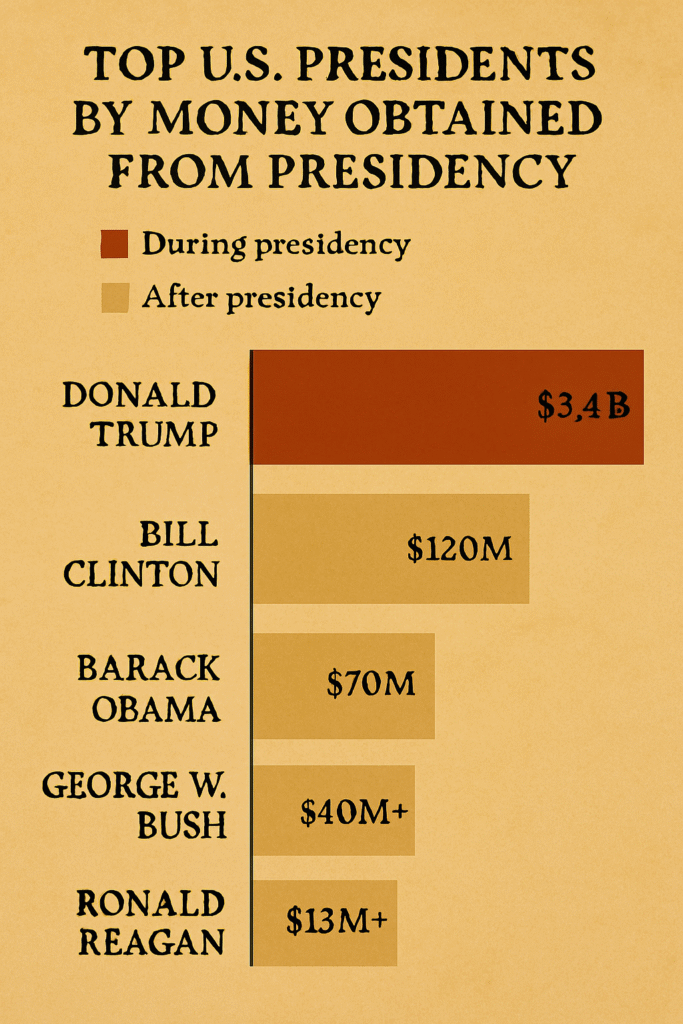
The Emoluments Clauses in the U.S. Constitution are preventative, designed to block even the appearance of undue influence. A bribe, on the other hand, is punitive—it’s a criminal act that requires proof of corrupt intent.
As one legal scholar put it:
“If a public official is paid to make a government decision, that payment would qualify as a bribe, not an emolument”.
So while both raise red flags about integrity and influence, bribes are overtly corrupt, whereas emoluments can be subtle, systemic, and legally gray.
As I pointed out earlier, the presidents before Trump, at least appeared obedient to the Emoluments Clause of the Constitution. They made their millions after they served the country. Trump, on the other hand, is apparently using his position as President to amass astronomical amounts of wealth while in office, from the Oval Office.
Final Thoughts Regarding Presidential Profiteering
The question that was occupying (plaguing) my mind which compelled me to commit to three days of research, and the authoring of this post, was simply this: Is it possible that Trump, his immediate family, and brand, have amassed more personal wealth during the first 6 months of 2025, than the aggregate wealth amassed by all previous US Presidents combined? This is what I discovered…
Based on the latest credible reporting (see my footnote links), it’s probable that Donald Trump and his family have amassed more personal wealth during the first half of 2025 than all previous U.S. Presidents combined.
What We Know About Trump’s Wealth in 2025
- Estimated Net Worth: Trump’s personal net worth sits around $5.1 billion, with Bloomberg briefly showing peaks near $6.5 billion earlier in 2025.
- Family Profits from Presidency: A New Yorker investigation estimates the Trump family has earned $3.4 billion from ventures tied to Trump’s political rise—including crypto, real estate, merchandise, and foreign investments.
- Key Drivers:
- $2 billion investment into Jared Kushner’s firm from Saudi Arabia
- Mar-a-Lago profits surged after Trump raised initiation fees to $1 million
- Trump-branded merchandise and crypto ventures added hundreds of millions
- PACs reportedly covered over $100 million in legal fees, indirectly preserving wealth
Wealth of All Previous U.S. Presidents Combined
According to adjusted estimates from 24/7 Wall St. and Wikipedia:
| President | Peak Net Worth (2022 USD) |
| George Washington | $539 million |
| Thomas Jefferson | $284 million |
| Bill Clinton | $245 million |
| Theodore Roosevelt | $168 million |
| Andrew Jackson | $159 million |
| Lyndon B. Johnson | $131 million |
| Barack Obama | $70 million |
| John F. Kennedy | $80 million (inherited) |
| Others (combined) | ~ $1 billion |
| Total (excluding Trump) | ~ $1.7–2 billion |
Even generously including inherited wealth (e.g., JFK’s family fortune), the combined peak net worth of all previous presidents likely falls below $3 billion.
So, Yes—during the first 1/2 year of Donald Trump’s second term as President, in 2025, He, his immediate family (proxing investments to avoid legal entanglements), and the Trump brand, have amassed more wealth in six months, than all previous presidents combined. But it’s important to note:
- Much of Trump’s wealth is tied to volatile assets (e.g., crypto, media equity)
- Historical presidential wealth was often inherited or accrued slowly, not explosively
- Ethical and legal scrutiny around Trump’s monetization of the presidency makes this comparison more than just financial—it’s a question of public trust
Conclusion
If Trump’s personal vision comes to pass, as it strongly appears is rapidly happening, soon it will be to late to do anything to stop the Trump train from impoverishing all but the already ultra-wealthy class, while destabilizing the world’s economies for the sake of building his personal wealth Empire. The time to act is now. Like and share this article across your social Media platforms. Email a link to this article to your Representatives and Senators, at the local, state, and federal levels. If these facts go viral online, people may wake up and demand a stop to the economic hemorrhaging, unlawful personal enrichment of Trump, and the insidious disgrace facing the United States for voting Trump into office, and then not doing anything to check his seemingly untouchable power. You can bank on this, as I write the last sentence of this exposé, the United States (perhaps along with the state of Israel) has now become the least liked (most disliked) nation on the planet. That does not sit right with me. How does it sit with you?
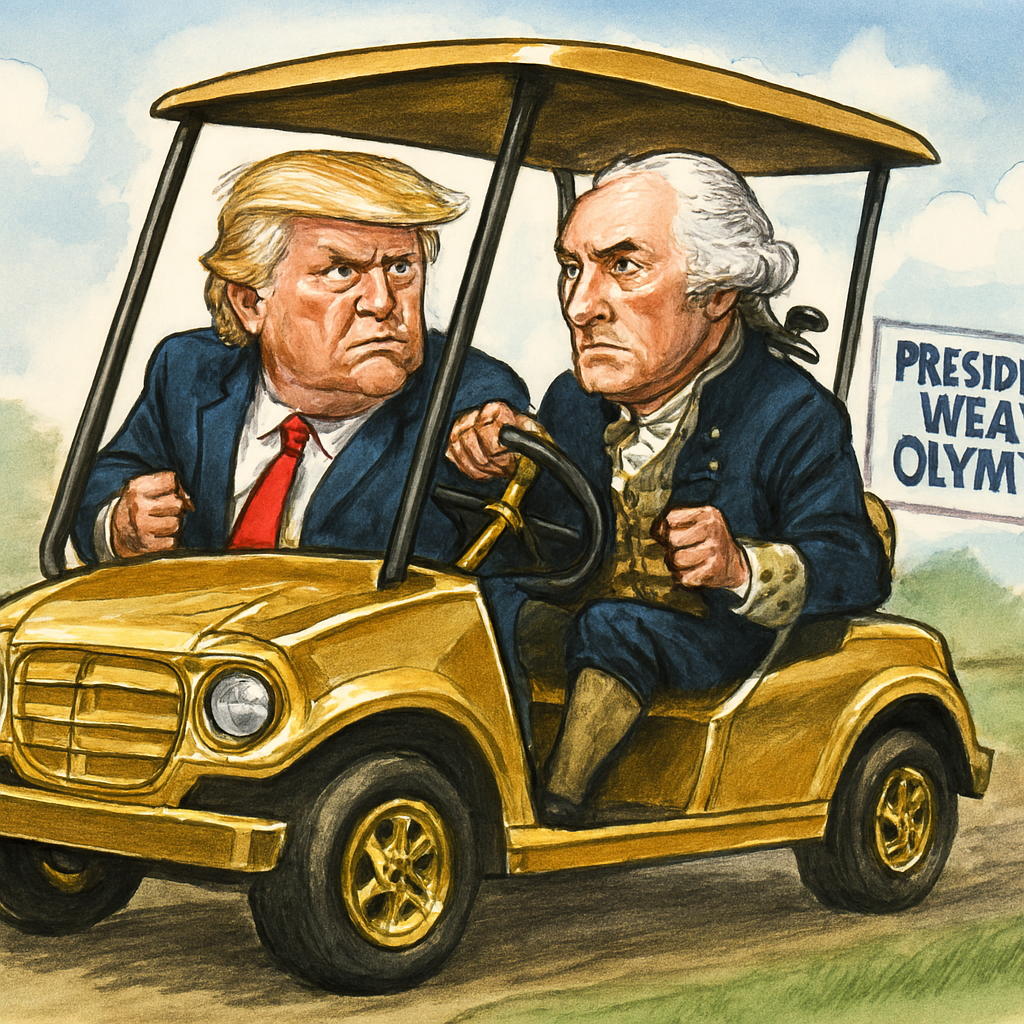
Washington replies: “I declined a salary. You declined decorum.”
FOOTNOTE LINKS:
Latest Credible reports as of August 25, 2005
Brand Vision: Donald Trump Net Worth 2025: The Billionaire Comeback Story | Brand Vision
MSNBC – MSN: Trump’s family has made $3.4 billion during his time as president, new report finds
The Economic Times / India Times: Trump presidency financial profits: $3.4 billion payday? Report says Trump family is cashing in big from White House – The Economic Times
